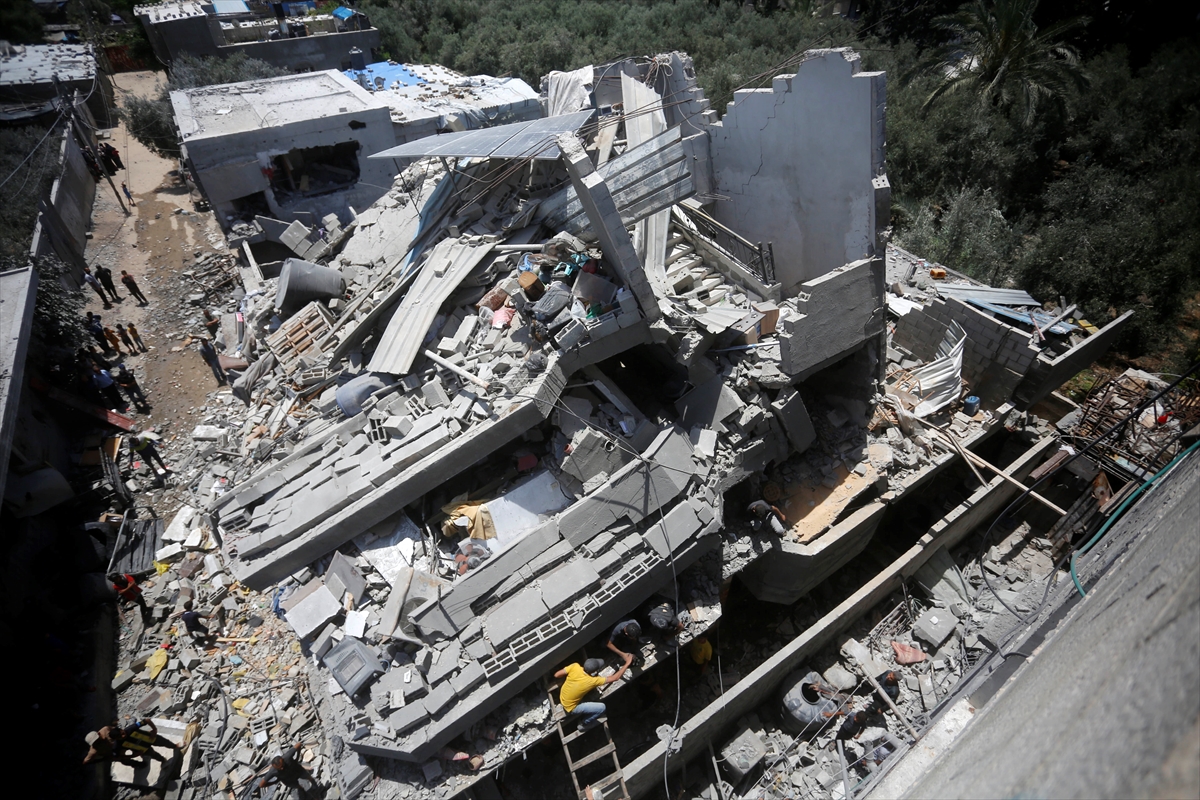
By Elham Asaad Buaras
London (The Muslim News): – Israel’s aid delivery mechanisms in the Gaza Strip have come under fierce international condemnation amid harrowing reports of dozens of Palestinians being shot dead while seeking food and medical assistance. Senior UN officials and humanitarian organisations have warned that the aid distribution process has become lethally dysfunctional, with mounting accusations that the Israeli military is weaponising humanitarian relief as part of its war strategy.
On Sunday, at least 49 Palestinians were killed and more than 200 injured near an aid distribution site in al-Mawasi, west of Rafah, after Israeli forces allegedly opened fire on civilians gathering for essential supplies. Eyewitnesses said Israeli military vehicles fired live ammunition, while drones dropped explosives as desperate residents approached a site operated by the Gaza Humanitarian Foundation (GHF), a US-based organisation backed by Israel.
The chaos overwhelmed medical facilities. A British doctor working at Nasser Hospital in Khan Younis described the emergency department as “absolute carnage”. In a video posted from the hospital, she said: “Locals are quoting anything from 100 to 200 injured. These are all gunshot wounds. All the bays are full. It’s absolute carnage, and there are even more people in the main emergency department.”
The same day, similar attacks were reported near the Netzarim Corridor in central Gaza and near the Bureij refugee camp, with further casualties and injuries. Israeli military spokesperson Avichay Adraee denied the army had targeted civilians and said the matter was under investigation. However, the military’s statement has been directly contradicted by hospital records, video evidence, and multiple eyewitness testimonies.
According to Gaza’s Health Ministry, Israeli forces have killed at least 54,418 Palestinians and wounded over 124,000 since launching its offensive in October 2023. On Sunday alone, 37 bodies were recovered and 136 people injured. “Many victims are still trapped under the rubble and on the roads as rescuers are unable to reach them,” the ministry said.
The UN’s top official for Palestinian refugees issued a stinging rebuke of Israel’s control of aid access. “Aid distribution has become a death trap,” said Philippe Lazzarini, Commissioner-General of UNRWA. “This humiliating system has forced thousands of hungry and desperate people to walk for tens of miles to an area that’s all but pulverised due to heavy bombardment by the Israeli army.”
Israeli media reported that the current aid delivery plan, which designates four distribution centres in the south and centre of Gaza, is intended to facilitate the depopulation of the territory’s north. According to Israel’s Army Radio, the military objective is to render northern Gaza a “completely depopulated area”.
Humanitarian organisations have denounced Israel’s approach in the strongest terms. Save the Children called the killings a “blatant and shocking disregard of international humanitarian law,” accusing Israeli forces of turning aid distribution into a “tool of war”. The charity added: “Directing desperate families to military-run sites only to open fire on them shows an unacceptable militarisation of humanitarian assistance.”
Meanwhile, Gaza’s healthcare system continues to collapse. Munir al-Bursh, Director-General of Gaza’s Health Ministry, said more than 3,000 trucks carrying medical aid remain blocked at the Egyptian border. “The occupation’s ongoing ban on the entry of medicine and vaccines has contributed to the spread of infectious diseases and epidemics,” he said.
Gaza City is also facing an unprecedented water crisis. The municipality reported that 75% of the city’s wells have been destroyed since October, with the remaining few operating only intermittently due to fuel shortages. “Water supplies have fallen below 25% of the minimum requirement,” the municipality warned.
On Sunday, Israeli forces destroyed the Noura Al-Kaabi Dialysis Hospital—the only facility in northern Gaza providing kidney treatment. Located in Beit Lahia, it served tens of thousands of patients across surrounding towns and refugee camps. Only eight dialysis machines remained operational before the hospital’s destruction, following repeated strikes in recent months.
International reaction has been swift and critical. British Minister for the Middle East and North Africa, Hamish Falconer, described the Rafah shootings as “appalling” and said they highlight “the desperate need to get aid in”. He called on Israel to “allow partners to operate in line with humanitarian principles and deliver lifesaving aid”.
The events in Gaza also drew sharp rebuke from Francesca Albanese, the UN Special Rapporteur on the situation of human rights in the occupied Palestinian territories. Responding to French President Emmanuel Macron’s assertion that abandoning Gaza would cost the West its moral credibility, Albanese wrote: “Tragically, it’s already done: the West has sacrificed its credibility through decades of free passes granted to Israel.”
“Millions in the West—for whom liberté, égalité, fraternité are universal values—are suffering. One path remains: sanction Israel and deploy a protection force in the oPt,” she added.
In a further sign of regional escalation, Israeli authorities suspended flights at Tel Aviv’s Ben Gurion Airport on Sunday following a reported missile attack from Yemen. According to Israeli media, a missile launched by Yemen’s Houthi movement was intercepted, triggering air-raid sirens across central Israel and prompting thousands to flee to bomb shelters. The Houthi group has not confirmed the launch.